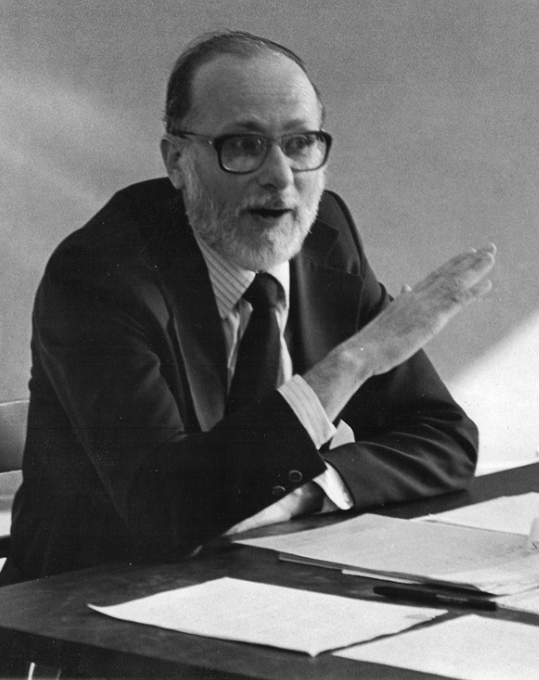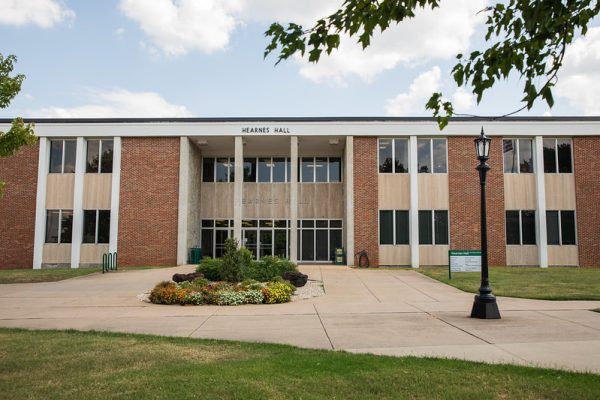‘You must have passion’
Six alum who were impacted by Richard Massa share stories in remembrance of their mentor and adviser during their time in Southern’s communication department from 1972-1999
Passion.
If one word could describe the impact Richard Massa had on his students, it would be passion.
From his trademark command “You Must Have Passion” to his guiding presence, students within the Department of Communications – from its inception to current form – have been impacted in some way by Massa.
Passion, Passion, Passion
Kelly Wilson, a 1983 graduate of the department and former communications instructor, said Massa’s motto of “Passion, Passion, Passion,” helped shape her into an effective leader and motivator.
“There wasn’t a day that didn’t go by that one of his directives was playing in my head,” Wilson said. “He set a high standard that was sometimes difficult to achieve, but the drive to give one’s best each and every day was the legacy he gave me.”
Wilson said she implemented Massa’s motto of hard work with her students.
“My standard line was ‘if you have 20 minutes, I can change your life,’” Wilson said. “I learned that a student willing to give me 20 minutes would later give me even more of their time.”
Wilson said the 20 minutes would expand into multiple meetings, which would then help the student develop and grow.
“There isn’t any magic; just empowerment and encouragement which I learned and received from Mr. Massa,” Wilson said.
As one of the department’s first graduates, Wilson said she often wondered if she lived up to Massa’s expectations.
“Just a few years ago we were walking from Plaster Hall together when he suddenly stopped, looked down at me (his 6-plus feet to my 5.2 feet) and said ‘I am very proud of you,’ yep totally out of the blue,” Wilson said. “My eyes welled up; those words rocked me and I felt so relieved and elated that I received that compliment. After his retirement, I received a hand written note thanking me for being me.”
Wilson said Massa’s presence in her world was life changing.
“I am thankful to him and others that became mentors for me,” Wilson said. “Their unsubstantiated believe in me and encouragement throughout the years held me up.”
A dark humor
Massa served as Jeffrey Todd Belk’s adviser from 1978 to 1980. Belk worked with Massa to develop a general studies degree with the goal of pursuing a master’s in filmmaking.
“I was a below average student who really couldn’t write and was often categorized as a punk rebel without a cause,” Belk said.
During this time period, Belk was named arts editor for The Chart. In that role, he often filled his assignments with movie and music reviews.
“Since I was taking theatre classes I developed a series of interviews with the teachers and the students,” Belk said. “One of the interviews with a student ended up quite controversial. There was a quote about a local business where the student gave a negative comment.
“When the business caught wind of the article they threatened the college with libel allegations.”
Belk said he gave Massa several headaches as the story was sorted out.
“Even though I never achieved my goal as a filmmaker, I must say Massa was able to raise my grade point average and elevated me to be able to professionally function in my several careers,” Belk said. “I will always remember Massa’s biting humor. It was dark and dry, and it often took on several meanings and I often pondered these statements for days.”
Life-long mentor
As Pat Payne began at Missouri Southern, she did so as one of the first non-traditional students within the department.
Knowing she wanted to pursue a writing-based career, she become involved with The Chart, and subsequently, Massa.
“Initially, he was somewhat intimidating, a persona he did his best to project,” Payne said. “But after a while, most of us who were there in the years I was at Missouri Southern realized intimidation was only one facet of a class act who knew what he was doing.
“From the first day of classes, this man had an impact on my college years, and the impact has continued to this day.”
Payne said she learned about many things from Massa including professionalism, ethics, interviewing, grammar, getting the facts right, and all the other knowledge needed to do a good job in the field of journalism and communication.
“Whether consciously or unconsciously, the lessons he taught in class and in personal interactions were reflected in the way I did my job,” Payne said. “Throughout my working career, I relied on the information Mr. Massa insisted we learn.”
Payne said she will miss knowing Massa is present within the world.
“I knew that if I needed advice or information, or just had something I wanted to talk about with him, he would be there for me,” Payne said. “I knew I was welcome to visit him, and he would be glad to see me. I knew he would be honest with me and give me the best advice or help that he could.
“It was a great comfort to just know that someone who was so influential in my life experience was willing to continue being my teacher, my mentor, and my friend throughout the years.”
Growing respect, love
Stephanie Davis Goad said Massa’s tough exterior and high expectations commanded respect from his students.
Initially, as a high school senior visiting campus, Goad said she found Massa “categorically intimidating.”
“Fortunately, my love for writing and my desire to be a journalist outweighed my fears and I decided to enter the program at Missouri Southern (then State College) in fall of 1987,” Goad said. “I had Intro to Human Communications with him my first semester, and I was no longer intimidated by him. Instead, I was absolutely mortified, especially when he slapped the lectern with his hand and said, ‘Passion! You have to have it!’”
Goad said Massa led the students through a series of icebreakers, designed to help them learn the names of their fellow classmates.
“He said ‘a good communications person never forgets a name,’” Goad said. “After that I was determined to remember the names of each person I met and often employed some of the tricks he taught us to help us remember.”
While it took a while for Goad to like Massa, she always respected him.
“I think my true love for the man kicked in when I learned how right he was on so many things,” Goad said. “He didn’t want us using only one source for a story, thought we should always remember names and faces, and whatever we did in life, we must do it with passion.”
She said Massa made her “dig down deep” within her soul, to discover her true passions.
“He also tested my salt as a journalist a few times during interviews with him, which I was able to pass, due to his leadership,” Goad said. “I seriously would not be where I am today had it not been for the influence and the life lessons Mr. Massa imparted.”
Goad said she learned to think about life differently because of Massa’s influence.
“One thing he taught us was that if you do something you are passionate about as your profession, then it is much more than a job,” Goad said.
Recalling a time Massa took her for a tour of his home, Davis said he stopped in front of one of the paintings he purchased with his wife, Teresa.
Massa told Goad he purchased the gift because Teresa “loved it, and as much as she loved looking at that painting, I loved looking at her.”
“He loved deeply, unapologetically, and with his whole heart,” Goad said. “I am so grateful to have had the privilege of knowing the softer side of him because those who only got to see his tough exterior never knew the true Mr. Massa. I am thankful I did.”
Lasting impact
Elizabeth Johnson said Massa served as one of the many guideposts which helped shape her life and vision.
With his influence and direction, Johnson said she obtained many things which others might see as unusual for a young, single mother.
“Under Richard Massa’s guidance, I learned to write, edit, layout a paper, take photographs and develop film,” Johnson said. “I covered controversies over teacher salaries and an R-rated speaker. I went to Washington to write about Jimmy Carter’s inauguration.
“As a result, it never occurred to me to say no when I was offered a job reporting news, weather and sports at KODE. It also never occurred to me – for better or for worse– to think I wasn’t qualified to forecast the weather.
That same influence also let Johnson ignore a news director who said he would never hire a woman with children.
“I’ve worked at a station in Springfield, Missouri, that regularly scooped ABC Nightline during the Jerry Falwell scandal. I was at the 1988 Democratic National Convention in Atlanta the night Bill Clinton gave one of the worst speeches ever, introducing Michael Dukakis,” Johnson said. “I’ve covered the Challenger disaster and September 11th, tornadoes and hurricanes, politics and entertainment.
“Not once did I think I couldn’t do any of those things. Even now, in my work in strategic communications, I didn’t hesitate when I needed to learn to shoot and edit video. I’m editing a newspaper again, back to my roots, using many of the skills I learned from Mr. Massa.”
Johnson said Massa was not only a great teacher, but also a kind man who brought out the best in his students.
“I realize his affection for us was eclipsed by his love of his family,” Johnson said. “In many ways, I think that was the love he shared with his students.
“I will miss him, but I know he lives on in those of us who had the privilege to know him, to learn from him and to love him.”
‘Go for it!’
Nearing the end of his college education, Eric Gruber found himself seeking out the then-retired Massa for guidance and career advice.
Massa suggested Gruber check out the Lawrence Journal-World as a possible source of employment.
Gruber sent the editor an inquiry, asking if they would be looking for a “newbie journalist.”
A phone call later, he was invited to come for an interview at the LJWorld’s sister papers in Eudora and De Soto. Eventually he accepted a job at the smaller papers.
“There’s a beauty in a small town that you don’t often find in a bigger city, something that I struggle to articulate well for those who haven’t experienced that life,” Gruber said. “Because of this one man’s suggestion, I left all I knew in search a new adventure for myself.”
Gruber was influenced by Massa, after his retirement, as he played a role in the international media seminar where students went to Paris, France for a week.
“He also helped coordinate a trip where I and two other students went to Central America for two weeks before my senior year began,” Gruber said. “While there, we covered stories about Panama, Costa Rica, Nicaragua, and Honduras.
“Massa, along with and Dr. Chad Stebbins, director of the Institute of International Studies at Missouri Southern, were instrumental in me seeing parts and people of the world that I may have never had the chance to see otherwise.”
Gruber said he mainly got to know Massa through a fellow student, Aaron Deslatte.
“Aaron was a brilliant writer, and loved to visit Massa. I loved hanging out with Aaron, and by default got to know Massa through frequent visits,” Gruber said. “Massa always welcomed us, and he and his wife, Teresa, gladly let students past and present drop in and chat away. The discussions about world events, politics and policy were always fascinating. Those discussions made me want to learn more.”
Before Massa’s death, Gruber messaged him looking for an answer to the the following question: “Regardless of your age now, what advice would you give your 40-year-old self?”
Massa wrote back “Go for it!.”
“The wisest decision I ever made was at the age of 40,” Massa told Gruber. “I decided to marry Teresa and to find a job at MSSU. I had other options — some sounding much better, some making more money, but I had grown weary of change and uncertainty and I needed security and purpose.”
Gruber said his wife, Amy, once asked “what was Mr. Massa? Was he our teacher?”
“I told her that I often referred to him as my mentor,” Gruber said. “While I stick with that assessment, I now realize it’s not the full truth. I was not his classroom pupil, but I was most certainly his student.
“The teacher has given me the lesson, and the lesson is this: life is yours to embrace, so go for it!”
Your donation will support the student journalists of Missouri Southern State University. Your contribution will allow us to purchase equipment and cover our annual website hosting costs.






























